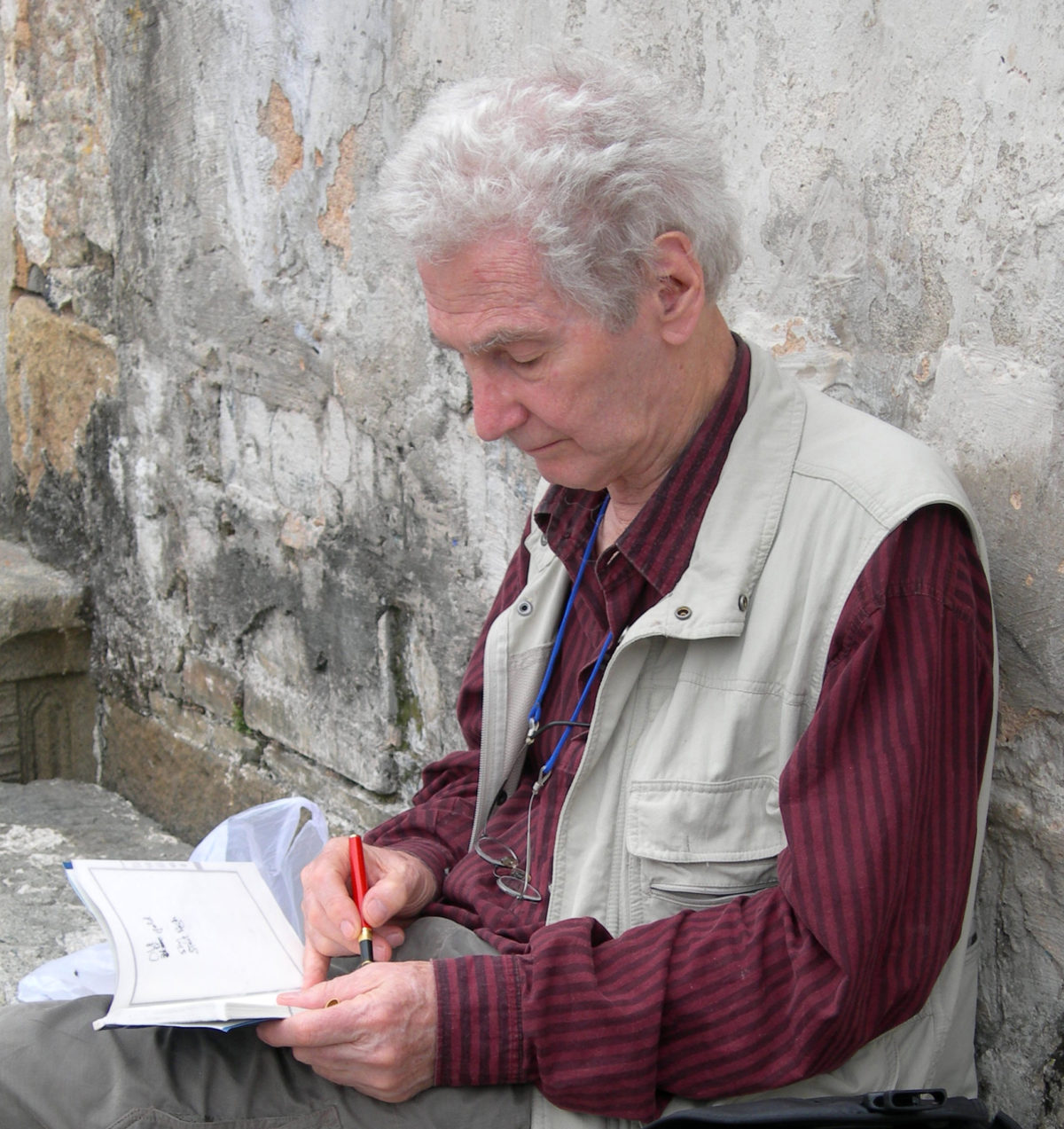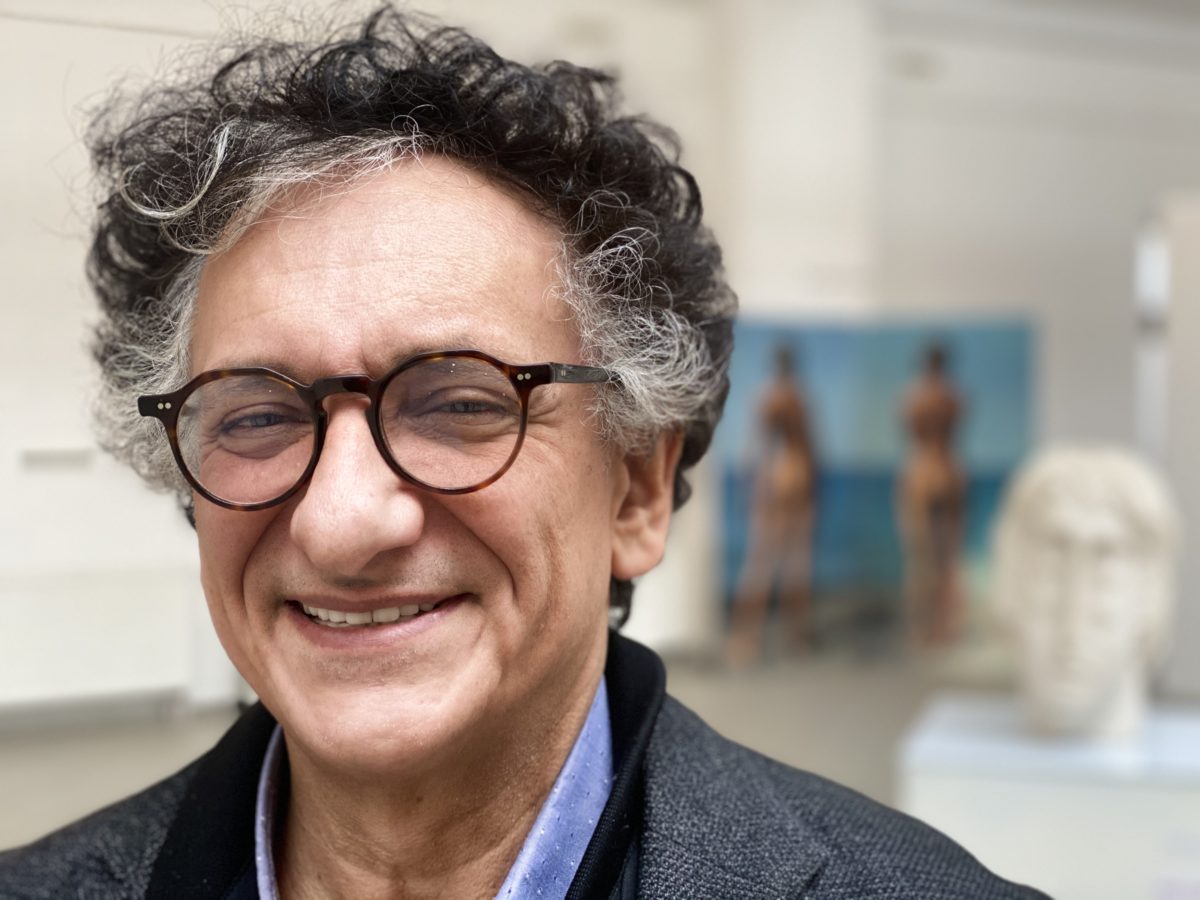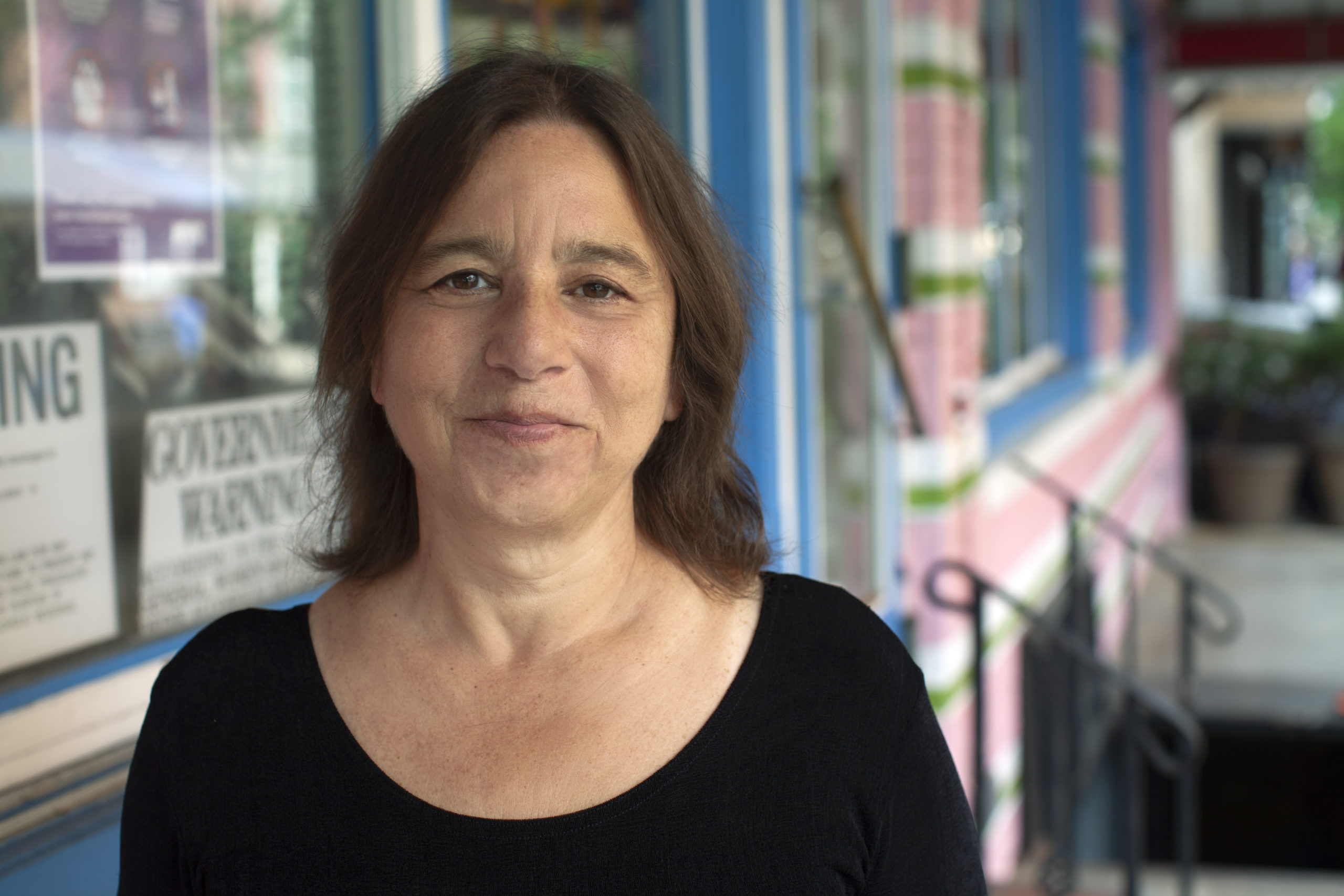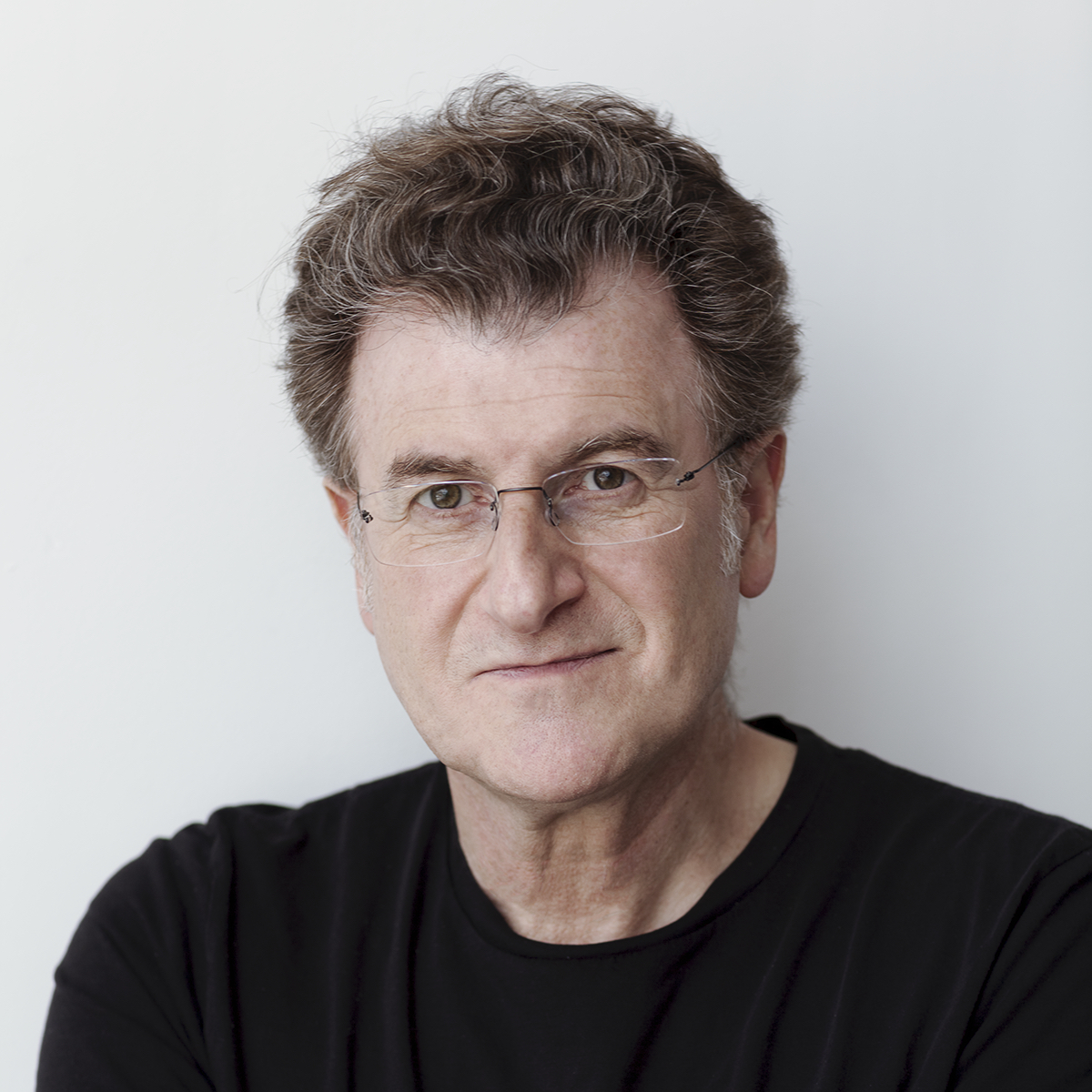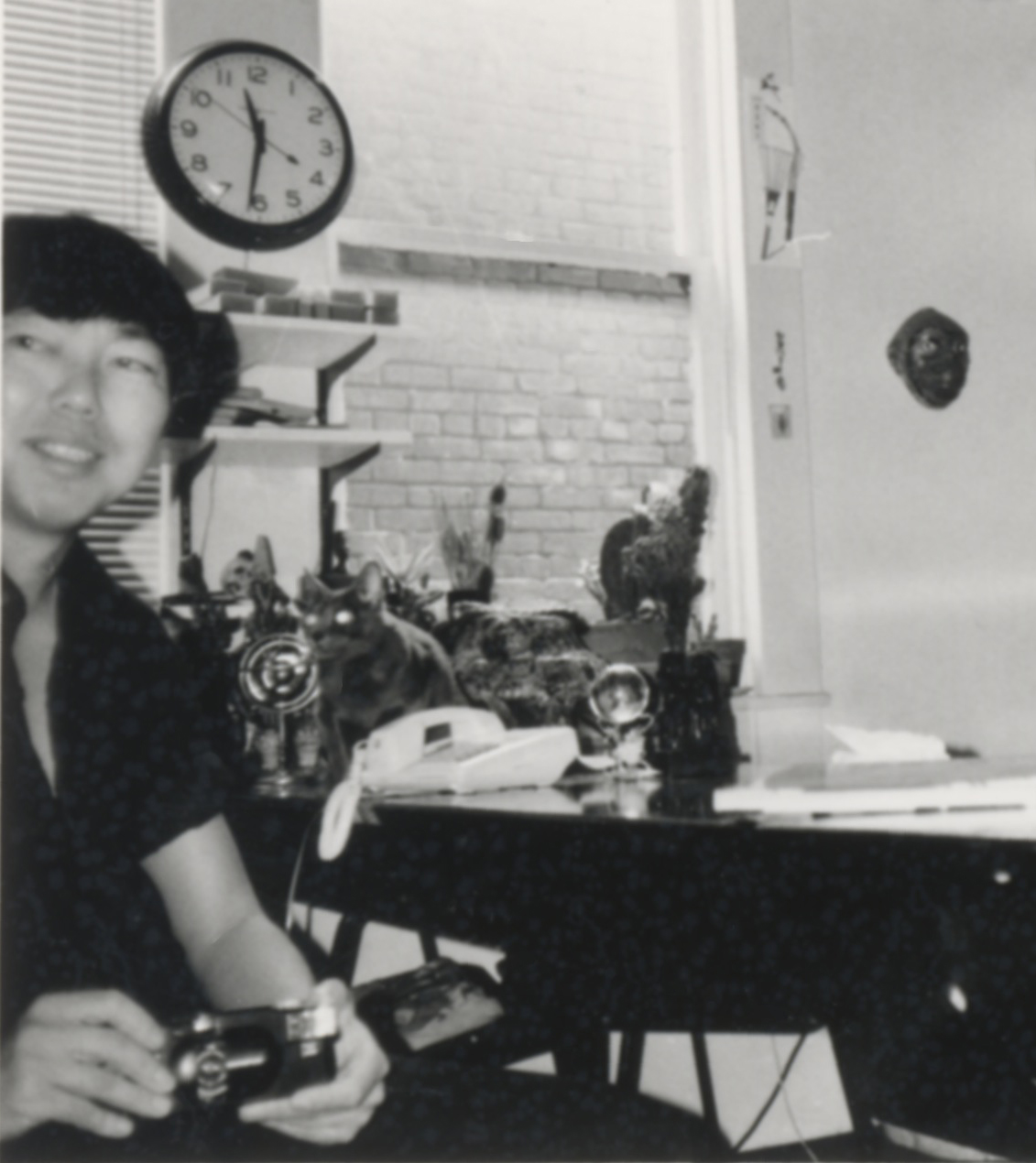
V. Vale, the founder and owner of Search & Destroy and RE/Search Publications is both an elusive and ever-present legendary figure in San Francisco’s cultural life. He can be found in front of Vesuvio’s Café and City Lights Bookstore in North Beach selling his Punk art zines, books, music and photos on weekends and is a regular at book fairs and international Punk history gatherings. I like to meet Vale at the Anne Bremer Memorial Library at SFAI and it was there we worked together on Bruce Conner: The Afternoon Interviews (2016).
When the editors of Dispatches approached me to facilitate an interview between them and Vale, I explained that this sort of interview would not be organized through digital comms in the way they would be accustomed to. First, I would have to arrange a meet-up by calling Vale on the phone, not by text or email. Second, they would have to meet Vale at his house and studio and find his doorbell. Third, I could not guarantee that the interview could be recorded or what analogue devices would be used for text. The following is an interview that took place in person with Vale in his North Beach neighborhood. (It has been edited and condensed for clarity.) It’s fun to play go-between for Vale: you never know what adventure he will lead you on and what rare book you might discover.
—Natasha Boas: San Francisco, January 2022
V. (“Valhalla”) Vale—the writer, editor, publisher, broadcaster, interviewer, legendary chronicler of underground scenes, and self- credentialed cultural anthropologist—was born in a Japanese internment camp near Jerome, Arkansas in 1944, the son of the socialist activist and wartime conscientious objector Kiyoshi Hamanaka, who later pursued a career as the actor Conrad Yama, and Mary Takaoka, a former vaudeville performer.
Vale graduated from UC Berkeley in 1966, with “a worthless degree in English literature,” and immediately moved to the Haight-Ashbury in San Francisco in time for what he insists was the real Summer of Love (as opposed to the media-heralded, flowers-in-your-hair happening of 1967). In Haight Street’s The Psychedelic Shop he found a poster recruiting members for the group which became Blue Cheer, and played keyboards with the band until it contracted to a trio July 15, 1967. That same day he moved to North Beach, where he has been ever since.
In 1977 Lawrence Ferlinghetti and Allen Ginsberg each donated $100 when Vale started Search & Destroy, his pioneer zine covering punk rock in the Bay from its Mabuhay Gardens days, “pre-Internet, pre- fax.” Punk’s disruptions conjured echoes of Dada and Situationism, and inspired a more ambitious project, RE/Search. He learned printing and started a typesetting business, which, to his surprise, gave him a living, and enabled him to print magazines and books on par with the big publishing houses. RE/Search deepened and extended Vale’s cultural forays: urban primitivism, pranks, industrial culture, displaying what Henry Rollins calls “Anger and curiosity.”
Vale believes art is collective, and it follows that the list of his subjects, sponsors, collaborators, etc., is encyclopedic, beginning with Kathy Acker and ends not until he finds the latest of the “1000 interesting people on this planet that I refer to as primary source thinkers.” William S. Burroughs and J. G. Ballard have been touchstone authors, and Bruce Sterling a staunch supporter. Comparisons have been made to Andy Warhol and Studs Terkel.
Vale’s most consistent collaborator is his wife, Marian Wallace; a 12-track digital album, in which he plays the spinet piano, Lockdown Lullabies, was released in 2020 and is available at https://researchpubs.bandcamp.com/.
DM: What is your vision of San Francisco and how has it changed?
V. VALE: What is my vision of San Francisco? It used to be a major cultural hub in my book. I went to New York and I was too intimidated to move there. And it was too dark and the weather is terrible most of the time. But San Francisco has the best climate in the world: Mediterranean. Also, the best topography because of the Seven Hills. There’s all this variety of views. We’re also right next to the ocean. We even have a lake by SF State University. We also have the hottest desert. You can go skiing in a one-day drive. We have access to the most amazing nature in the world: the Redwoods.
So for you it’s about the environment and nature?
Well, that’s the foundational part. To me the basics are the climate, the geography, the topography but… I also think we have some of the most beautiful architecture in the world, just walking around—especially North Beach. I read that North Beach was built and planned by city planners and architects from Genoa, Italy (another port city) so it’s literally like being in “Little Italy.” And Coit Tower is a magical spot—it’s so beautiful and the views are great. When I moved here I was paying rent like $20 and $25 a month for a room. And I thought it would always stay that way. I didn’t realize the world would be destroyed by real estate speculation. For every artist in the world the hardest challenge they face every month is: How do I raise next month’s high rent? In San Francisco, or any major city—
—but especially here.
I just wish that we could start all over again with a bottom line of affordable rent, everywhere in the world.
The most basic thing we need is the roof over our heads… the rents are way too high. Both small businesses and humans can’t afford the rent…. RENT IS THE ROOT OF ALL EVIL. We have another new aphorism!
Do you think that would attract more creatives here?
It would help. In a way I’m glad that covid happened because I read that a hundred thousand “techies” moved out. I got an apartment in 1970, a small, four-room apartment two blocks away and the owner was a 95-year-old Italian man who made his living shining shoes. But he had managed to buy a three-story building with five apartments and a basement. My rent was $90 a month.
Was that a lot for you then?
No, it was affordable, and he said, “I like to give my fellow man a break.” Do you think any other realtor in the world has that attitude? Hell no. So I say real estate is ruining the world. The artificially high prices have nothing to do with helping humans survive on planet Earth. The most basic thing we need is the roof over our heads… the rents are way too high. Both small businesses and humans can’t afford the rent. That is the root of all evil: RENT IS THE ROOT OF ALL EVIL. We have another new aphorism!
Well that leads to a question about money. How can artists avoid succumbing to conventional wisdom and self-censorship, endeavors that make them conform to financial realities?
Well, I guess you can cut your brain in half and one half can produce commercial work that’s blatantly commercial. The other half can create any art idea you have where you don’t give a damn if it’s commercial or not. But I think one needs to do something to benefit “society.” I think the favorite time of my life was when I ran a home computer-typesetting business and rented an outside office. My business did so well that I was shocked, and it probably didn’t do THAT well; it’s just that I was finally getting a middle-class income. I grew up on welfare. My mother was mentally ill. I was lucky to get us AFDC (aid for financially-dependent children). I joked that I supported my mother because she couldn’t hold down a job. My mother was smart, she moved us to some tiny town in Riverside County where all the rents were really cheap and everything was cheap. Anyway, artists, to survive now, they have to kind of bunch up in apartments. They gotta share apartments. They gotta keep the rent down so they can afford to buy art supplies.
Tell us a bit about your influences.
[chuckles] Oh, now that’s a funny one! That’s a whole can of worms because my main art mentors were always Andy Warhol and Marcel Duchamp—they’re the two main figures—
Not Bruce Conner?
No, he was an anti-role model: Whatever he did, don’t do it! Now, the Dialogues with Duchamp by Pierre Cabanne has got to be one of the most important books ever put on paper. It’s not written, it’s a real conversation like we’re having. And Duchamp is just pulling out these little nuggets—principles, really—to live by; that’s what we really want. We want causes, we want principles, we don’t want just sound-bites!
This is the most important thing Duchamp said: “Never repeat, despite the encores.” That’s where so many people get derailed; I mean artists who are alive when they actually get some commercial success (which is very rare). So many of these artists just start imitating their younger selves. And if you’re living and dynamic and meeting people and having conversations and speculating and having global cultural input, then you might get some new, new ideas. People always say there’s nothing new under the sun, but there’s new-ish things under the sun!
I wouldn’t get too hung up on: “Am I really being original 100%—is it only 90% or 80% or 70%?” I wouldn’t go granular on that. But, the shower is a great time—or as soon as you wake up—to come up with ideas and then at least write ’em in a notebook. Yeah, the notebook is the key part of living, because you record your ideas. You will wake up with ideas; you will get ideas in the shower; you will get ideas sitting on the porcelain throne.
In your “Goals of Life” you have a tactics section. I don’t know if you call it a manifesto—
It’s not a manifesto, it’s just “Goals of Life.”
Well most things like that don’t have strategies or tactics—they just tell you what to do. They don’t necessarily always tell you how.
I like to think of everything on that sheet of paper as just suggestions. They’re not orders.
But they’re helpful, like spending the first hour of the morning writing—
Well, that’s totally invaluable. That’s YOU; that’s when YOU come out, or whatever comes out in your notebook is actually YOU and not someone else, for the most part. Yeah, I don’t see how you can become yourself—whatever that is, which keeps changing, by the way—without notebooks, and without writing first thing in the morning—not just getting up and checking email.
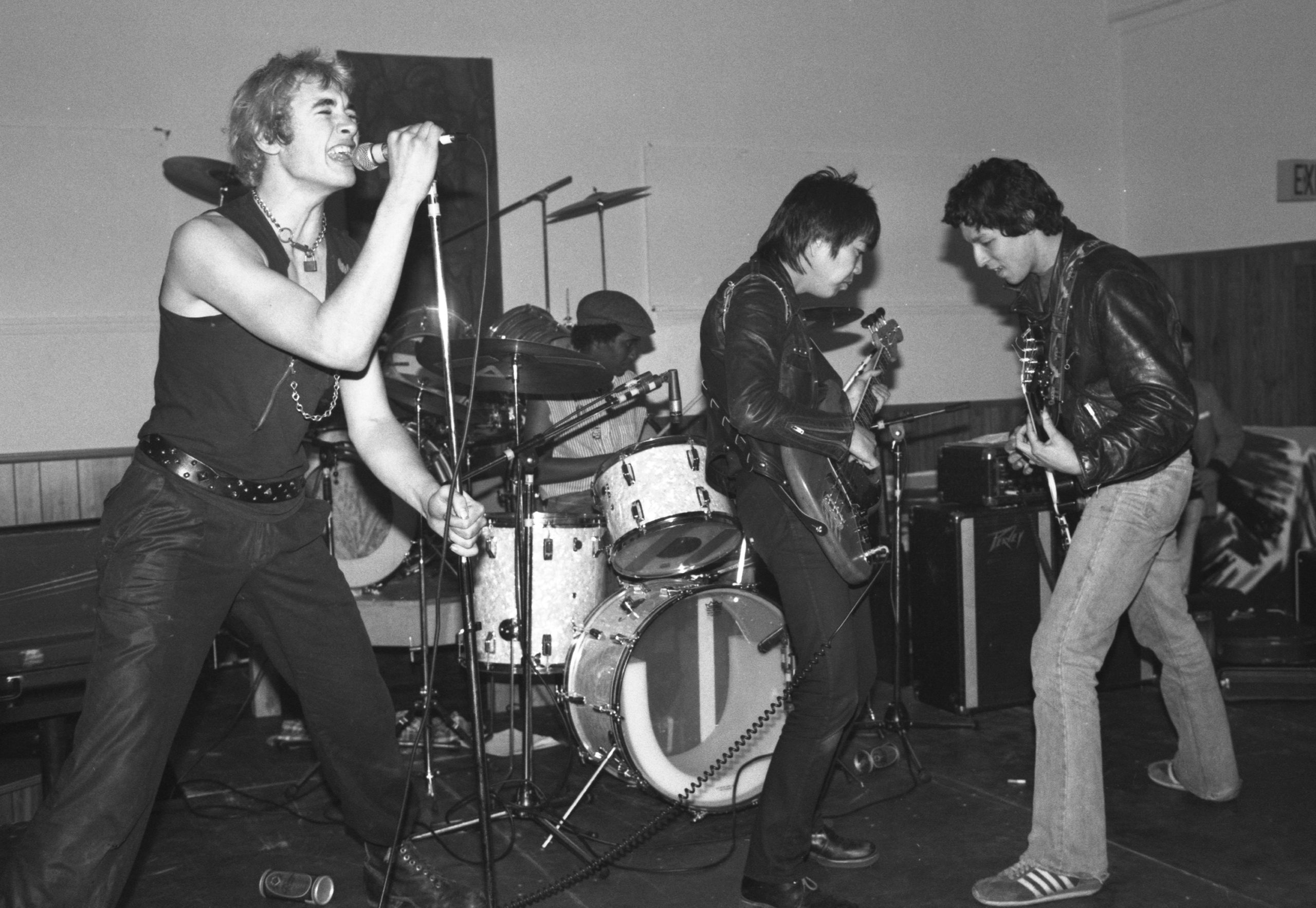
Is that how you maintain your authentic self?
Well, I didn’t check email today or I would have seen your questions.
Do you think there is a genuine counterculture in the Bay Area? And if so, what is it up to?
You know, I ask that question almost every day because I’m hoping to find one! Maybe the “counter-culture” now is atomized: a bunch of tiny little groups like you guys. I went to the San Francisco Art Institute for a party Thursday afternoon. There were like five kids sitting there talking and I asked them, “Okay, you guys. I’m totally out of it. What are the hippest films and books happening now?” and no one could think of anything. In the Sixties, I think “everyone” knew to read One Flew Over the Cuckoo’s Nest. I think Mark Fisher is hip, but I only knew about him for a few months. I just sent for every book he wrote. Who else?
David Graeber. He just had a book posthumously published, The Dawn of Everything.
Oh, I really should get it. And they always say everyone’s gotta read the guy who invented that phrase, “You can imagine the end of the world, but you can’t imagine the end of capitalism.”
Fredric Jameson?
Yeah, but I never read his book—
Well, what’s great about Fisher, a disciple of Jameson’s, is that he filters it. And he contextualizes it, like in essays on The Cure or Christopher Nolan.
Exactly. Who are the greatest filmmakers now?
I don’t know who the great filmmakers are, I don’t know if that kind of grouping exists any longer. There are the mainstream filmmakers, and there are the “arthouse” ones. What do you think of the current age of digital journal magazines?
Someone gave me a daily subscription to the Financial Times but there’s hardly anything I want to read in it. However, the articles I do wanna read are really good. I’m lucky to find one article a day that I want to cut out. The ones on Monday have a disproportionate number of articles on women in the workplace and their rights issues and questions and suggestions on how not to get screwed. So, the Monday issue—that one’s packed. I try to read it right away with a pair of scissors and cut out the articles I want and put the rest instantly into recycling.
So your journal also functions as a scrapbook. That sounds like another “Goal for Life.” Do you have some more that aren’t included in your written version?
Maybe I’m not overly sympathetic to single people’s problems, but I think that as soon as you can: find a partner so there’s two of you working on the Number One Question: “How the fuck do we make next month’s rent?” That is the key question Every Day Of The Rest Of Your Life. And if there’s two of you worrying about it, it helps. It helps everything!
The key thing about trying to stay together and not hating each other after a while because little things about them annoy you is: Play word games, coin aphorisms, come up with puns, three-word phrases, rhymes. Rhymes are very important, alliteration is very important. That’s how you renew your relationship, every hour, every minute or whatever, is through language. You’ve got to get into spotting rhymes. Words are not just tools. Actually, you try for no separation between art and life, no separation between play and work—uhm, good luck with that! No separation between art and daily life. Have you noticed that a lot of people in their art don’t have humor? Some artists are way too serious.
What Warhol and Duchamp seem to have in common is a sense of humor.
Yeah, and sometimes it’s so subtle it takes someone else to point it out. Both of them embraced contradiction. I saw a photo of Warhol talking to a cardinal or a Pope; was he really religious?!? But years ago I read that Warhol regularly went to a church. Well, in a church you can get privacy and silence and no one bothers you. So they are havens. In fact, some of them are super beautiful inside; [here’s an idea:] Tour all the local cathedrals as “art”!
Bruce Conner was a humorist as well. You talk a lot about black humor—
Or dark humor—it could be purple. That’s because dark humor is sort of taking pessimism to the ultimate extreme—anything to make things funnier. You have to train your brain—train your brain—a three-word phrase, to come up with the darkest possible extrapolation instantly, no matter what anyone says.
Always surround yourself with the smartest-funniest-most rebellious people you can find. You don’t have time for more than a handful of people in your life anyway. And always surround yourself with only people who encourage you!
Do you think “collectives” achieve something original and break new ground, or is that something reserved for individual talent?
I think there’s no such thing as individuals making breakthroughs. I think you will find behind so many famous artists historically, I would think if they had a wife, that wife was majorly responsible for a lot of the originality and quality control and a million other things. My wife edits everything that I write and improves it. So the smallest possible group is two. And then you might get a random email from someone you haven’t heard from for a while and they give you an idea and boom it’s incorporated in your work, your writing or language.
I wrote a zine called How to Read and it has a little section called “How to Write” that I included as an afterthought. The first premise is: All reading is preparation for writing—your writing. In other words, don’t just read anymore, first ask: “How can this (what I’m about to read) improve my writing?” Well, you might learn a new word, a new phrase you can substitute words and repurpose and then it’s your original phrase. Basically, try to read differently. Read for ideas to improve your own personal writing because that’s all we are: language. When you get down to talking to anyone, you’re hoping for some kind of originality of language, some style, some word they use that is part of their signature speech… I think I strayed from your question about Art and Artifice. I think everyone ought to do as pure projects as they can and do them fast so they don’t get all corrupted and bogged down by overthinking. I think overthinking is a huge enemy—or it can be. And over-analysis.
I kind of like being an animal as much as possible and being spontaneous… but it’s kind of not that easy—
To be spontaneous?
I mean, I definitely try to schedule as least as possible.
And what do you find yourself doing with your time?
Just do nothing-time. That’s on the “Goals of Life” flier. That’s when you sort of regroup, you actually do some reflection, maybe even a little bit of analysis—the dreaded analysis. You know, like maybe come up with Other Ideas. I think a lot of your best ideas might arise by the process of what they call lateral thinking—not linear logic. Suddenly some idea comes from left field and you say, “That’s it!”
Your focus on underground icons has turned you into one. What do you make of this?
I hate that word!
What word would you use?
I don’t know. Just call me a persister—I haven’t gone away yet.
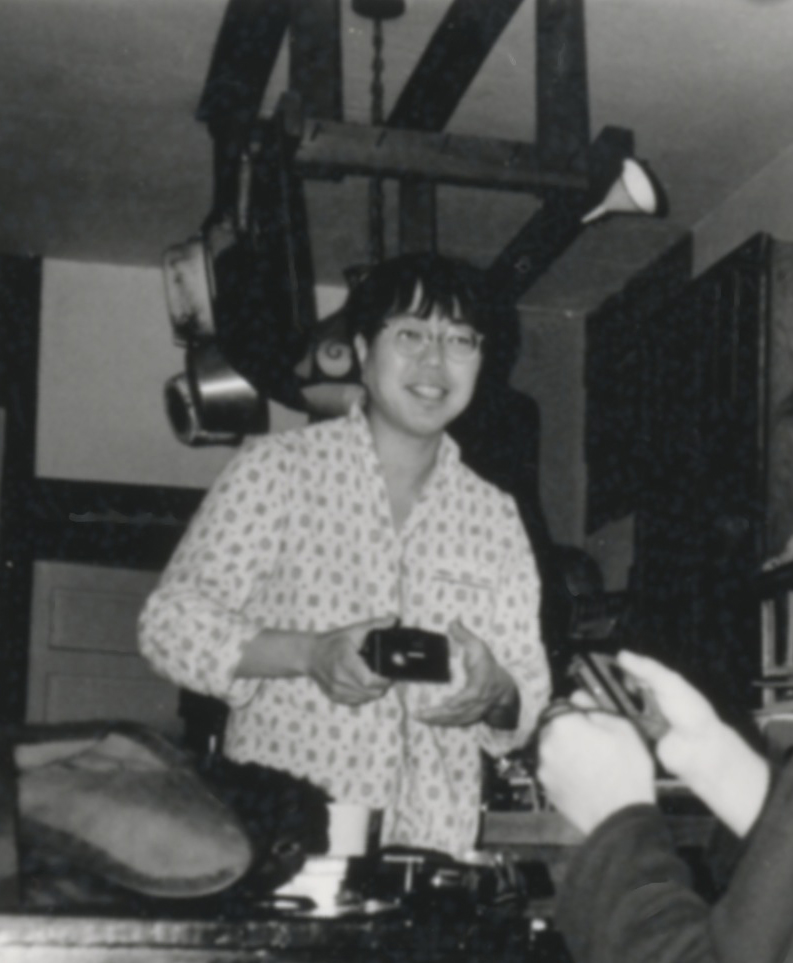
You started out documenting—
—documenting and catalyzing; I like to think that the purpose of all communication is to encourage other people to do something with their lives. I say: Always surround yourself with the smartest-funniest-most rebellious people you can find. You don’t have time for more than a handful of people in your life anyway. And always surround yourself with only people who encourage you! But if they’re too smartass and analytical and intellectual, then be careful. Because we need help, we need all the encouragement we can get just to keep doing anything that sort of is “kicking against the pricks” or, you know, against the status quo.
Jumping off of that, in your book, Bruce Conner: The Afternoon Interviews (2016), Conner revealed he was “reluctant to be the septuagenarian pet of today’s avant-garde.”
That’s a great phrase—
Does this resonate with you?
Well, I hate to think about anything like that because the less self-conscious you are, the better. People start describing you as nouns rather than verbs. And I want to be as least self-conscious as possible, and just do whatever idea as fast as possible. But, I’ve got a bunch of projects that I’ve been so lazy that I haven’t done—blame it on covid. Believe me, there’s always more to do. You will die with projects undone!
But I don’t like that. I’d rather that didn’t happen. So, I don’t know. “First technology, then culture” is one of my aphorisms and some people don’t understand it! Whoever invented the technology so that every car going by blasts incredibly loud, booming, rattling bass—did they do us all a favor?!? And this technology didn’t exist 20 or 30 years ago. But now it’s here.
Can you talk a bit about the relationships early in your career that were most formative for you?
Some were terrible.
But who was important to you?
I guess the few people that I personally knew: Burroughs, Ballard, Philip Lamantia…

It is undeniable that you’ve been important to the DIY scene in the Bay Area. I wonder where you see the future of DIY, given rising living costs and a certain lack of initiative from younger people in counterculture movements. Do you find zine production an important part of moving forward, or do you think, with these revolutionary changes in technology, DIY will have to take on a completely new form?
Well, let’s say I have a deep distrust of clouds and server farms everywhere. I just don’t think they’re really here for the ages, or even a hundred years. A person can be in Samoa or somewhere and find some ZINE from a hundred years earlier. And if it’s in a language you can understand, it may still inspire you to do your own. And it’s so cheap to do a mini-zine, take one sheet of paper, fold it six times, and presto: you have mini-zines you can carry around and give to everyone.
I’m a fan of zines because they can’t be altered. Anything can be hacked and altered on the Internet. But, paper—unless someone took a marker and blacked it all out like the Freedom of Information documents you request. I’ve never done it, but you see them in movies: Everything’s blacked out except one little word here and there.
There are lots of invisible waves going through the air that pass through our bodies. There are those conspiracy theories saying that cell phone towers cause cancer, but… as a kid I always wondered, “How does my portable radio get radio waves from a transmitter a hundred miles away? Do they pass through my body, or do they bounce off ? What about TV signals? Well, now there’s a million more signals called “microwaves” or whatever. We don’t know everything yet.
Everything is molecular but everything isn’t molecular. There’s that physics theory that there are no solids; everything is actually a wave form that you think is solid but actually there are wave forms working together to make it appear solid—
Mark Fisher proposes the idea of “atomization” as one of the primary reasons society is in crisis: because society is atomized, everything is separate, individually over-stressed.
It’s funny that a lot of this “atomization” is the byproduct of “liberation.” So many people are calling out for their own liberation and are forming groups. I thought the internet would be great because everyone could access, say, the entire contents of the British Library. All these books that used to be so hard to find you can now read. Therefore knowledge can be free, instead of remaining the privilege of a few rich people who are rare book collectors. Well, the thing I didn’t predict was the rise of all this dis-information from the Trumpian types—far right-wingers. And how fanatical these people can get. And the internet can bring them all to Washington, D.C. on January 6 where at least five people died and hundreds were injured.
Maybe everyone has to start their own underground and try and support other people who have parallel undergrounds (assuming enough congruities). Goethe wrote a book called Elective Affinities. Why do you like this person more than others? Because you have more in common that you’re passionate about! I mean, Why fight it? It’s kind of “natural,” quote unquote (if anything’s natural)! So maybe all we can do is just form our own tiny groups and hope they’re part of the “underground” of today.
Since Ghost Ship, all the underground warehouses have been harmed. I think about the “hippie” movement I was part of and there would be all these free gatherings in the Panhandle—not Golden Gate Park. Well, there was a so-called “Hippie Hill,” but was too far away; the Panhandle was just two blocks away from the corner of Haight and Ashbury. Then they started having free rock concerts there; if you didn’t get to see Jimi Hendrix at the Fillmore, he might be playing tomorrow afternoon at 4pm for free. But you needed that FREE SPACE. And now with covid for the next 10 years, we need more PARKS; outdoor space where you can just hang out or eat your sack lunch or meditate or do yoga or tai chi; whatever. Like when I went to the Art Institute Thursday night, I couldn’t even get suggestions as to the absolutely most essential, hippest, cutting-edge, ahead-of-the-curve film or book—
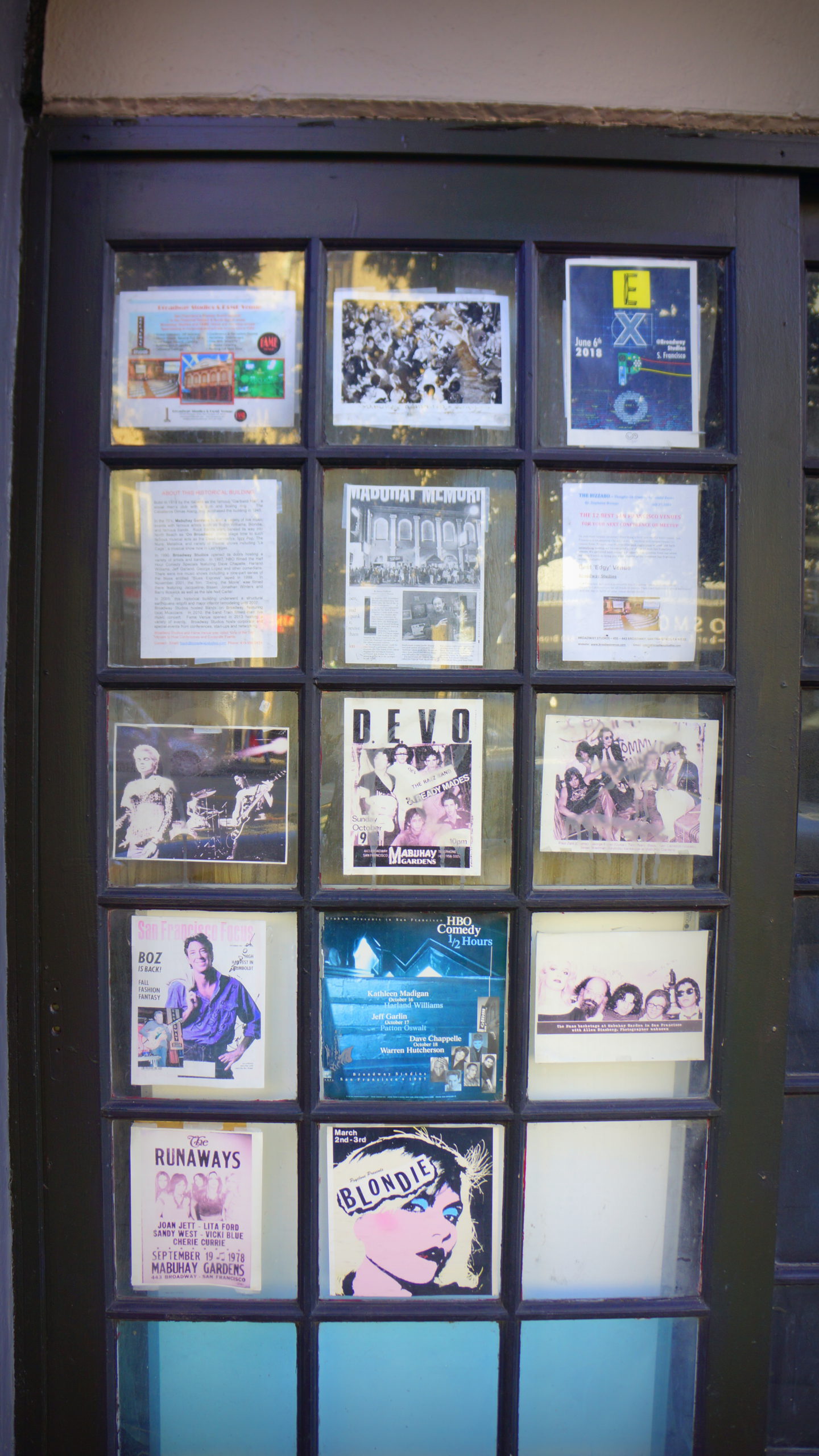
I guess there are just too many.
That’s what they all said. There are too many movies—too many.
There can’t be one that everyone’s gathering around. There’s something for everyone, which is great—
Maybe, but it’s all in the direction of nichification rather than universalization.
The larger collective ritual of participation is lacking—it’s just small cliques and groups, and bits and pieces of popular culture of the world.
You only have so much attention. The “ATTENTION ECONOMY”! Jaron Lanier, 20 years ago, said that Facebook should be paying you for entering your data on Facebook. Now it’s TikTok, or WhatsApp, or—there’s other names I don’t know. Well, I’m on Instagram; I can relate to Instagram because it’s simple to post a few images and a teeny bit of text. It’s a notification system, too.
You do get a lot of information from Instagram—
Yeah, right.
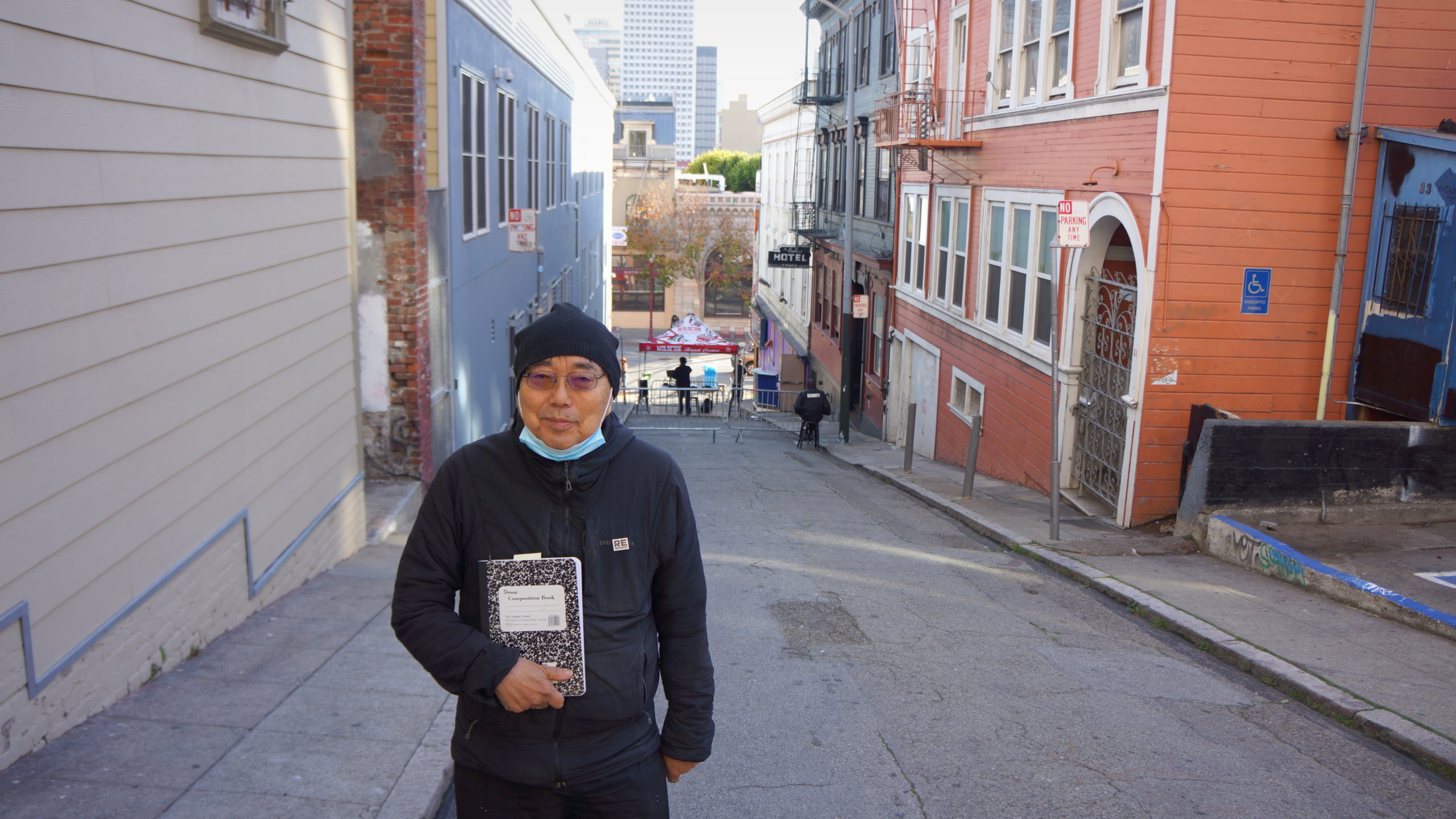
That’s where you’ll find those underground warehouse parties
Yeah, yeah, yeah. I’ll bet.

